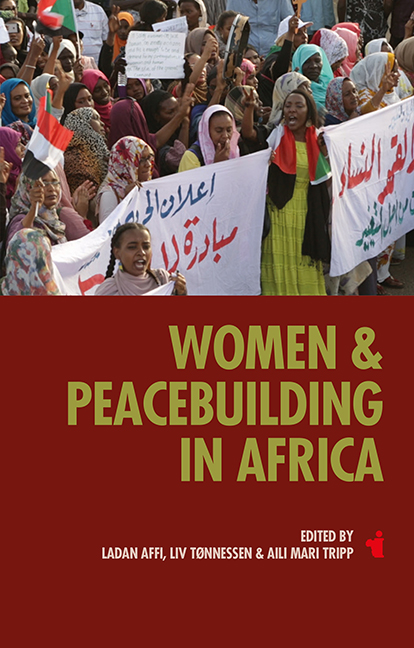Book contents
- Frontmatter
- Contents
- List of Illustrations
- Notes on Contributors
- Acknowledgement
- Abbreviations
- Maps
- 1 Introduction: The Gendering of Peacebuilding in Africa
- 2 Women Activists’ Informal Peacebuilding Strategies in South Sudan
- 3 ‘Ba Sa Jin Mu’ (They Don’t Listen to Us): Women and Peacebuilding in North-Eastern Nigeria
- 4 No Going Back: Somali Women’s Fight for Political Inclusion
- 5 Sudanese Women’s Demands for Freedom, Peace, and Justice in the 2019 Revolution
- 6 The Fight for Democracy and Women’s Rights in Algeria: A Long Legacy of Struggle
- 7 Conclusions: Women’s Peace Activism in Africa
- Bibliography
- Index
7 - Conclusions: Women’s Peace Activism in Africa
Published online by Cambridge University Press: 26 May 2022
- Frontmatter
- Contents
- List of Illustrations
- Notes on Contributors
- Acknowledgement
- Abbreviations
- Maps
- 1 Introduction: The Gendering of Peacebuilding in Africa
- 2 Women Activists’ Informal Peacebuilding Strategies in South Sudan
- 3 ‘Ba Sa Jin Mu’ (They Don’t Listen to Us): Women and Peacebuilding in North-Eastern Nigeria
- 4 No Going Back: Somali Women’s Fight for Political Inclusion
- 5 Sudanese Women’s Demands for Freedom, Peace, and Justice in the 2019 Revolution
- 6 The Fight for Democracy and Women’s Rights in Algeria: A Long Legacy of Struggle
- 7 Conclusions: Women’s Peace Activism in Africa
- Bibliography
- Index
Summary
Exclusion from Postconflict Governance: Women's Struggle for a Seat at the Table
This book has shown how the failure to recognise women's many contributions becomes a major cost in peacebuilding efforts. The exclusion of women from formal peacebuilding processes, including political decision-making in postconflict governance structures, is a commonality across the cases presented in the book. This is in spite of their participation being recognised as an essential aspect of inclusive social justice in peace processes and UNSCR 1325 mandating their inclusion at all levels of decision-making in peace processes for the maintenance and promotion of peace and security. Women are excluded, their proposals and needs are viewed as incidental rather than essential, and successes are measured without taking into account that some outcomes may not serve to improve women's lives as much as men’s. The case studies in this book show how women's marginalisation in peace mediation and larger peacebuilding processes is often symptomatic of their inferior status in their communities and politically institutionalised hegemonic masculine norms. By hegemonic masculinity we refer to ‘a set of values, established by men in power that functions to include and exclude, and to organize society in gender unequal ways … ‘ (Jewkes et. al 2015, 113).
In Somalia, access to political office is mediated through clan membership, but since lineage is traced through the father, women are considered transient members who belong to neither their father's clan nor their husband’s. Women's multiple clan connections have made it difficult for them to participate in the clan-based politics of the country (Affi in this book; Affi 2020a; Dini 2010).
In north-east Nigeria, women's compounded marginalisation complicates women's inclusion as full actors in peacebuilding and politics more broadly. The north-east of Nigeria is a heavily patriarchal society where the region's religious and cultural norms have defined women's status through reproduction and largely confined them to domestic roles. Womanhood has become a central theme in male-dominated political struggles, especially when the female body is perceived as a battleground in a global conflict between Islam and ‘the West’ (Okoli and Nnaemeka Azom 2019).
However, gender inequality does not tell the whole story and needs to be considered alongside other intersecting factors.
- Type
- Chapter
- Information
- Women and Peacebuilding in Africa , pp. 149 - 158Publisher: Boydell & BrewerPrint publication year: 2021



